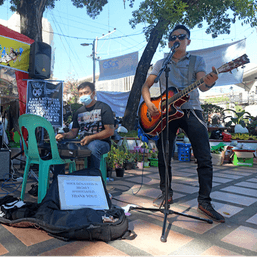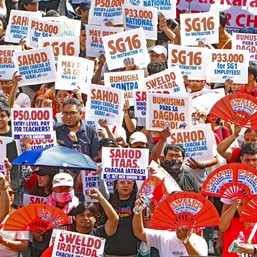SUMMARY
This is AI generated summarization, which may have errors. For context, always refer to the full article.

Petsa de peligro is already a thing of the past for hundreds of employees of the Shangri-La Hotels.
That’s because the Shangri-La group, which operates several five-star luxury hotels in the country, is among the Philippines’ pioneering adopters of earned wage access (EWA).
“The whole Shangri-La group, the five hotels here in the Philippines are already part of it,” Paywatch president Rowell del Fierro said. “They were solving for a lot of problems with the employees. And they saw this as a really great fit to improve the employee benefits all around now.”

To put it simply, EWA lets you withdraw the salary that you’ve already earned in a month but haven’t yet been paid. Once a business partners with an EWA service provider like Paywatch, employees can easily access a portion of their earned wages at any time of the day for a small, flat fee. In other words, with EWA, it’s payday every day.
“If they can access their earnings, that should be the first pocket that they should access and not loans,” del Fierro told Rappler. “As far as Shangri-La is concerned, they will try anything that they feel is progressive. They don’t want to promote loans. But they want to improve the well-being of their employees.”
The Shangri-La Group is the first hotel chain in the Philippines to offer the EWA facility to its employees through Paywatch, but other businesses are quickly adopting it too. Among these are Rustan’s, Wilmar, and some Dunkin Donuts outlets.
While Paywatch only has around 30 partners here in the Philippines, the company expects that EWA could become a mainstream employee benefit in the future.
“It makes a lot of sense. While today, it’s mainly offered to large companies with large employee count, I do see that the program will evolve such that it becomes also available to [small and medium enterprises],” Del Fierro told Rappler.
And it’s not just Paywatch that’s trying to bring EWA to employees. Digital bank GoTyme just also recently began offering EWA to companies within the Gokongwei Group, of which GoTyme is also a part.
“We’re in discussions with other corporates. Our first external one will probably be in the third quarter,” GoTyme president and chief executive officer Nate Clarke told Rappler.
Coming to BPOs soon?
Paywatch is also targeting to bring EWA to the hundreds of thousands of employees in the Philippines’ business process outsourcing (BPO) sector.
Del Fierro said that they’re in talks with several large BPOs in the Philippines who believe that EWA could be a “perfect” solution to help them with their high attrition rates. In particular, BPOs note that their highest attrition rate comes during a new employee’s first 90 days.
“This is the time when the employee needs a lot of money. They’re adjusting to a new job, things like that. So they’re trying to resolve the highest risk,” the Paywatch Philippines president told Rappler.
For Del Fierro, this is especially important because EWA can help these employees – some of whom are paid around the minimum wage mark – to avoid relying on exploitative salary loans or other products from shady digital lending apps.
“If there’s a need for cash flow, this should be their first pocket and not to borrow money,” Del Fierro told Rappler, adding that some lenders charge interest as high as 10% per day.
Happier, more productive employees
In other countries like the United States and Malaysia, EWA has already made its mark, with big brands like McDonald’s, Subway, Walmart, and Uber being among its earliest adopters. And it’s proven to be effective, too.
One example is Tesco Lotus in Malaysia. Before adopting EWA, the average tenure of an employee at the chain was just 90 days, and their employee turnover was at 108% per year.
After making EWA available to employees, the retail chain reported that their turnover rate improved to 60% per year. Frequent EWA users also stayed in their jobs three times longer than those employees who didn’t use the facility.
In the Philippines, EWA awareness and adoption is still just starting out. Paywatch has only been in the market for around six months, which also means that there’s not enough data yet that shows similarly dramatic positive effects for local employers.
But Del Fierro noted that EWA has also shown to be sticky among early adopters in the Philippines. Paywatch Philippines reported that 70% of its users are active, with users making an average of 3.9 withdrawals per month.
“The magic happens when you are able to convince the employers to provide this employee benefit to their employees because they also see a lot of value. It translates to a lot of business value to them – whether it’s people becoming happier, or people showing up because may access na sila pang pamasahe ‘pag petsa de peligro (they now have access to commute money even before payday).” – Rappler.com
Add a comment
How does this make you feel?
![[Finterest] End to petsa de peligro? How earned wage access can help you avoid loans](https://www.rappler.com/tachyon/2023/01/shutterstock-digital-money-lending-app.jpg?fit=449%2C449)





There are no comments yet. Add your comment to start the conversation.